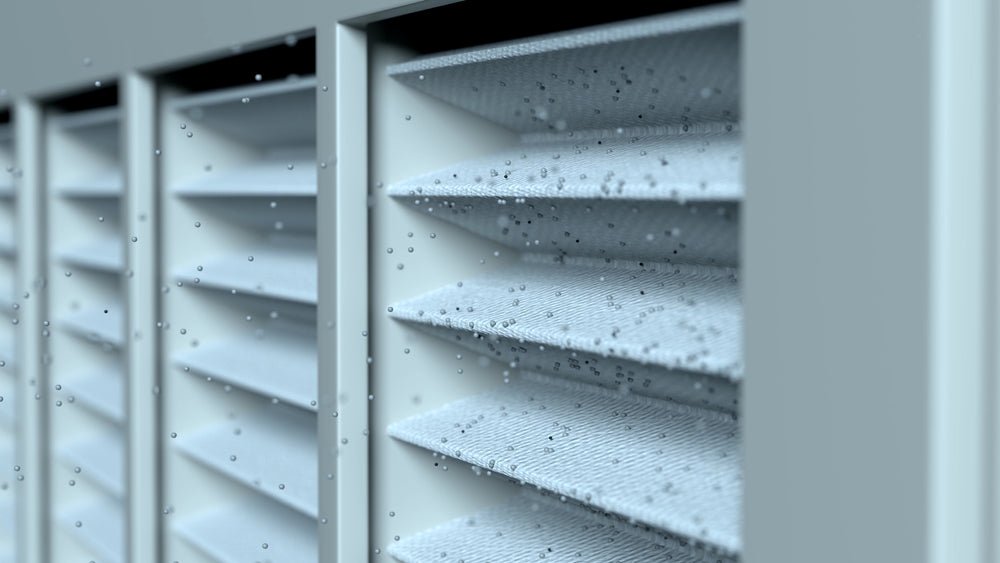
MERV vs HEPA: Which Filter Should I Get?
Share
The air in our homes and offices is full of contaminants like dust, pollen, mold spores, and even bacteria and viruses—or at least it would be if we didn't filter them out as air passes through HVAC and furnace systems.
The particles we want to filter range in size from visible to the naked eye to smaller than a virus. An air filter's efficiency measures how well the filter media captures particles of these sizes. There are two main efficiency rating systems for air filters: MERV and HEPA.
In this article, we'll explain both systems and how they impact a filter's suitability for your home's HVAC system.
MERV Air Filters
MERV (Minimum Efficiency Reporting Value) indicates how well an air filter traps airborne particles of various sizes. The MERV scale goes from 1 to 16, with higher numbers indicating better filtration efficiency.
MERV ratings are determined by testing a filter's ability to capture particles within specific size ranges, from 0.3 to 10 micrometers (µm). The filter undergoes repeated testing, and the worst performance among these tests is used to determine its MERV rating, ensuring that the rating reflects the filter's minimum efficiency.
Here's a breakdown of the MERV rating scale:
-
MERV 1-4: Captures large particles like pollen, dust mites, and textile fibers. Commonly used in residential settings and window AC units.
-
MERV 5-7: Captures smaller particles such as mold spores, pet dander, and hair spray. Suitable for better residential, commercial, and industrial workplaces.
-
MERV 8-12: Captures finer particles like auto emissions, lead dust, and larger bacteria. Used in superior residential settings, better commercial buildings, and hospital labs.
-
MERV 13-16: Captures very fine particles, including bacteria, tobacco smoke, and sneeze droplets. Typically used in hospital surgical centers and residences requiring high filtration.
You may also come across air filters rated MERV 17-20. These are not officially recognized MERV ratings, but they are sometimes used for filters that claim HEPA or ULPA levels of filtration efficiency.
HEPA AIR Filters
HEPA, which stands for High-Efficiency Particulate Air, is a type of air filter designed to remove at least 99.95% (ISO, European Standard) or 99.97% (ASME, U.S. DOE) of airborne particles with a diameter of 0.3 micrometers (µm). These high-efficiency filters are used in air filtration systems where air quality is paramount, such as:
-
Medical facilities: Operating rooms, isolation units, and areas requiring contamination control.
-
Industrial and commercial: Cleanrooms for manufacturing semiconductors, pharmaceuticals, and other sensitive products.
-
Residential: Air purifiers, vacuum cleaners, and some HVAC systems to improve indoor air quality.
MERV vs. HEPA Filter Efficiency
While MERV filters are rated based on their ability to capture particles of varying sizes, HEPA filters capture at least 99.95% to 99.97% of particles as small as 0.3 µm. HEPA filters are more efficient than most MERV-rated filters in capturing ultra-fine particles.
However, you should be aware that higher MERV ratings, such as MERV 13-16, can capture a significant portion of small particles, including bacteria and some viruses. These filters are almost as efficient as HEPA filters while providing a good balance between filtration efficiency, cost-effectiveness, and HVAC airflow.
Impact of MERV and HEPA Filters on HVAC Systems
When choosing an air filter for your HVAC system, consider the impact on airflow and system performance. High MERV-rated filters (MERV 13 and above) and HEPA filters have denser materials that can restrict airflow more than lower-rated filters. Increased resistance can cause the HVAC system to work harder, reducing airflow and increasing energy consumption and operational costs.
The increased strain on the system may also lead to more frequent maintenance needs. It's essential to check the maximum MERV rating that your HVAC system can handle to avoid reduced efficiency and potential damage. A MERV rating between MERV 8 and MERV 13 is recommended for most residential systems, balancing air quality and system efficiency.
These limitations are why HEPA filters are more often found on vacuum cleaners and standalone air purifiers than on air conditioning systems, which have to move large volumes of air through our homes' expansive spaces.
Choosing the Right Filter for Your Home or Business
When selecting an air filter, consider the following factors:
-
Indoor air quality requirements: Determine the level of filtration needed based on your home or business's specific needs, such as allergies, asthma, or other health concerns.
-
HVAC system compatibility: Ensure that your chosen filter is compatible with your HVAC system and won't cause undue strain or reduced efficiency. Note some systems such as the Carrier Germicidal Air Purifier or GAP and Lennox PureAir Systems are designed for higher MERV filters.
-
Filter lifespan and maintenance: Consider the recommended replacement frequency and associated costs for your chosen filter type.
-
Budget: Balance the upfront and long-term costs of the filter with your air quality needs and system compatibility.
While HEPA filters offer the highest filtration efficiency, they may not be necessary or compatible with your HVAC system. MERV filters, particularly those with higher ratings, provide excellent filtration for many residential and commercial applications.
Buy Compatible HVAC Filter Replacements from Atomic Filters
Atomic Filters offers a comprehensive range of MERV 8 and MERV 11 Filters. Our MERV 8 Air Filters combine excellent value for money with outstanding filtering efficiency. Consider our MERV 11 and MERV 13 air filters if you need more thorough air filtration.
